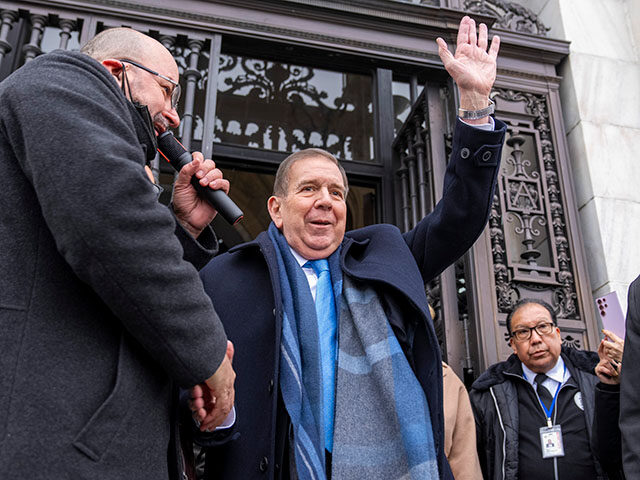Exiled Venezuelan opposition presidential candidate Edmundo González is slated to meet with outgoing U.S. President Joe Biden on Monday, the Spanish news agency EFE reported.
González, who fled to Spain in after the socialist Maduro regime issued an arrest warrant against him, is recognized by the United States and several other countries as the winner of the fraudulent July 28 presidential election, a sham electoral event that both he and socialist dictator Nicolás Maduro claim to have won.
The 75-year-old former diplomat is presently conducting a whirlwind tour across several Latin American nations and the United States ahead of January 10, 2025 — the date when both he and Maduro say they will be sworn into the presidency of Venezuela. González has insisted that he will return to Caracas to be inaugurated, to which the Maduro regime responded last week by placing a $100,000 bounty against him.
Unnamed official sources with knowledge of the logistics of González’s visit told EFE that the Venezuelan opposition candidate will meet President Biden on Monday. EFE reported that González expects to meet with Biden to continue searching for support ahead of the January 10 inauguration date. González announced his arrival in Washington on Sunday.
González kicked off his whirlwind tour on Saturday with a visit to Buenos Aires, Argentina, where he met with President Javier Milei. Milei, a staunch anti-communist, stressed “the need to strengthen regional collaboration to build a prosperous Latin America free from the oppressive yoke of any type of dictatorial and socialist regime.”
González continued his tour with a brief visit to Uruguay, where he met with outgoing President Luis Lacalle Pou and held an online meeting with Paraguayan President Santiago Peña before traveling to the United States. The Venezuelan opposition candidate will reportedly travel to Panama on January 8 to meet with President José Raúl Mulino and will then visit the Dominican Republic to meet with President Luis Abinader.
The July 28 sham presidential election has been widely described as fraudulent by several countries and international organizations. While Venezuela’s National Electoral Council (CNE) proclaimed Maduro the winner of the fraudulent election, it has refused to publish voter data that can corroborate the dictator’s claimed victory.
The Venezuelan opposition contested the election and published nationwide voter tallies collected on the day of the election that they claim demonstrate that González defeated Maduro in a landslide. The opposition published digital copies of the tallies on a website.
Neither González nor any member of the Venezuelan opposition has given public details as to how González intends to travel to Caracas to be sworn in as president on January 10 while avoiding the arrest warrant and $100,000 bounty against him.
WATCH — Watch: Billboard of Maduro Set Ablaze amid Venezuelan Election Protests:
After several former Latin American presidents expressed their intention to accompany González to Caracas for his inauguration, the head of the Venezuelan National Assembly Jorge Rodríguez threatened on Sunday to declare anyone who accompanies the opposition candidate persona non grata and their presence in the country an act of “invasion.” Venezuelan opposition leader María Corina Machado called on Venezuelans living in the country and abroad to head to the streets on Thursday, January 9, and peacefully protest against the Maduro regime.
González published a video on social media calling for the Venezuelan Armed Forces to overcome “the challenges” that the country faces and “defend popular sovereignty,” which he claimed was evident in the results of the sham presidential elections presented by the opposition.
“According to the 1999 Constitution, promoted by [late socialist dictator] Hugo Chávez Frías on January 10, by the sovereign will of the Venezuelan people, I must assume the role of commander in chief, with the responsibility of protecting our families and directing our efforts toward a future of well-being and prosperity for all Venezuelans,” González said.
The developing situation in Venezuela and the upcoming swearing in of both Maduro and González mark the second time in a row that Venezuela has “dual presidents,” with each contesting the position from one another — echoing the events that surrounded the interim presidency of Juan Guaidó.
After Nicolás Maduro held a fraudulent presidential election in 2018, the Venezuelan National Assembly — at the time controlled by the opposition — acted in response to what the nation’s constitution describes as a “rupture in the democratic order.” Guaidó, who at the time was the head of the parliament, was installed as interim president of Venezuela in January 2019.
The interim presidency was established as a result of Maduro illegally usurping the position through the fraudulent election, with the clear intention of ousting Maduro’s illegitimate usurpation of power and restoring democracy in Venezuela through the establishment of a transitional government and free elections.
While Guaidó’s interim presidency received the support of the United States and much of the free world, it did not manage to exercise any power in Venezuela. Maduro and his socialist regime retained full control of the country and its institutions, effectively leaving Guaidó as a symbolic figure.
Ultimately, the Maduro regime ousted the opposition-led National Assembly in yet another fraudulent election in late 2020, forcing many of its members into exile. After failing to achieve all of its promised goals, the ousted opposition lawmakers voted to dissolve Guaidó’s interim presidency in December 2022 in an improvised Zoom call riddled with tech issues, leaving Maduro’s illegitimate presidency the sole uncontested seat of power in Venezuela. Guaidó was eventually deported from Colombia to Miami in 2023, where he resides with his family ever since.
Christian K. Caruzo is a Venezuelan writer and documents life under socialism. You can follow him on Twitter here.

COMMENTS
Please let us know if you're having issues with commenting.